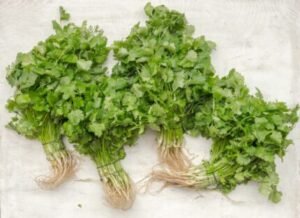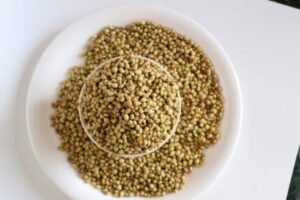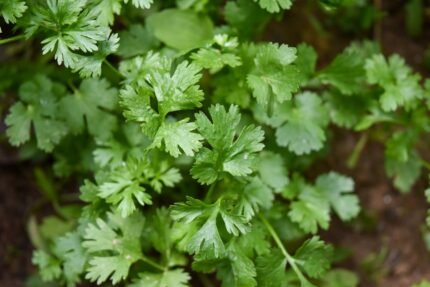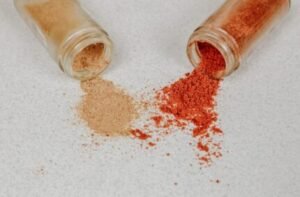Medically reviewed by Dr. Ramesh Gaddam, M.D. — Written by Sumalatha, D.N.H.E
“Dhaniya” is the Hindi word for coriander. Coriander refers to both the herb and the spice derived from the seeds of the coriander plant (Coriandrum sativum). The fresh leaves and stems of the plant are commonly used in cooking, particularly in Indian, Middle Eastern, and other global cuisines, to add flavor and freshness to dishes.
The seeds are also used as a spice and have a slightly citrusy, nutty flavor. Coriander is a versatile ingredient in cooking and is used in a wide range of dishes, including curries, soups, salads, and as a garnish. It’s a staple in many spice blends, such as curry powder and garam masala.
Nutritional profile for coriander (dhaniya) per 100-gram
| Nutrient | Amount per 100g |
|---|---|
| Calories | 23 kcal |
| Protein | 2.13 g |
| Carbohydrates | 3.67 g |
| Dietary Fiber | 2.8 g |
| Fat | 0.52 g |
| Vitamins and Minerals | |
| Vitamin A (as beta-carotene) | 3377 IU |
| Vitamin C | 27 mg |
| Vitamin K | 310 μg |
| Folate (Vitamin B9) | 62 µg |
| Potassium | 521 mg |
| Calcium | 67 mg |
| Iron | 1.77 mg |
| Magnesium | 26 mg |
| Phosphorus | 48 mg |
| Zinc | 0.5 mg |

Dhaniya (Coriander) Benefits
Coriander, or dhaniya, offers a variety of potential health benefits due to its nutritional content and the presence of various bioactive compounds. Here are some of the potential benefits of coriander:
Rich in Nutrients:
Coriander is a good source of vitamins and minerals, including vitamin A, vitamin C, vitamin K, folate, potassium, calcium, and iron, which are essential for overall health.
Antioxidant Properties:
Coriander contains antioxidants like beta-carotene, which can help combat the damaging effects of free radicals in the body, reducing the risk of chronic diseases.
Digestive Aid:
Coriander has traditionally been used to improve digestion. It can help alleviate symptoms of indigestion, gas, and bloating.
Anti-Inflammatory:
Some compounds in coriander, such as linoleic acid, have anti-inflammatory properties and may be beneficial for conditions involving inflammation.
Cholesterol Management:
Coriander may help lower levels of LDL (bad) cholesterol and increase HDL (good) cholesterol, potentially reducing the risk of heart disease.
Blood Sugar Control:
Some studies suggest that coriander may have a role in managing blood sugar levels and reducing the risk of diabetes.
Antibacterial Properties:
Coriander exhibits antibacterial properties and can help combat foodborne illnesses and infections.
Pain Relief:
It has been used traditionally as a natural pain reliever, particularly for headaches and muscle aches.
Anti-Anxiety:
Some animal studies have suggested that coriander may have anxiolytic (anxiety-reducing) effects.
Skin Health:
Coriander extracts are sometimes used in skincare products due to their potential to improve skin conditions.
Weight Management:
Coriander’s diuretic properties may help with weight management by reducing water retention.
Menstrual Relief:
Coriander may help alleviate menstrual cramps and irregularities in some women.
Detoxification:
It is believed to aid in the detoxification process, helping to eliminate toxins from the body.
It’s important to note that while coriander offers these potential health benefits, individual responses can vary. It’s often used as a culinary herb in various dishes, and its inclusion in your diet can be a flavorful way to enjoy these potential advantages. If you have specific health concerns or conditions, it’s a good idea to consult with a healthcare professional before using coriander or any other herb or spice as a remedy.

Dhaniya (Coriander) Uses
- Culinary Uses:
- Seasoning: Coriander leaves (cilantro) and seeds are commonly used as seasonings in cooking. The fresh leaves add a fresh, citrusy flavor to dishes, while the seeds provide a warm, earthy, and slightly citrusy taste.
- Spice Blends: Ground coriander is an essential component of many spice blends, such as curry powder, garam masala, and chili powder.
- Soups and Stews: Coriander is often added to soups and stews to enhance their flavor.
- Salsas and Chutneys: Fresh coriander leaves are a key ingredient in many salsas and chutneys.
- Pickles: Coriander seeds are used in pickling recipes for flavor and as a preservative.
- Garnish:
- Fresh coriander leaves make a popular garnish for a wide range of dishes, including curries, salads, and rice.
- Beverages:
- Coriander seeds are sometimes used in the brewing of certain types of beer and in the production of gin.
- Medicinal Uses:
- In traditional medicine, coriander has been used to treat digestive issues, inflammation, and as a natural remedy for ailments like headaches.
- Essential Oils:
- Coriander essential oil is used in aromatherapy and can have calming and stress-reducing properties.
- Cosmetics and Skincare:
- Coriander extracts and essential oils are used in some skincare and cosmetic products due to their potential benefits for the skin.
- Insect Repellent:
- Coriander oil is used as a natural insect repellent.
- Flavor Enhancer:
- Ground coriander can be used as a flavor enhancer in various dishes, including meat, vegetables, and rice dishes.
- Traditional Remedies:
- In some cultures, coriander has been used as a traditional remedy for various ailments, including colds and fevers.
- Culinary Decor: Coriander leaves are sometimes used as an attractive garnish and decoration on plates and dishes.
- Herbal Teas: Coriander seeds can be used to make herbal teas, which are believed to have digestive benefits.
- Preservative: Coriander has been used historically as a natural preservative for pickles and certain foods.
Coriander’s versatility and unique flavor make it a popular and essential ingredient in various culinary traditions and other applications. It can be used in both its fresh leaf form (cilantro) and its seed form (coriander seeds), each offering a distinct flavor profile.

Dhaniya (Coriander) Side Effects
While coriander (dhaniya) is generally safe for most people when consumed in moderate amounts as a culinary herb or spice, there can be some potential side effects or considerations to keep in mind:
Allergies:
Some individuals may be allergic to coriander and can experience symptoms such as skin rashes, itching, swelling, or respiratory issues. If you are known to have allergies to other spices or herbs, be cautious when trying coriander.
Gastrointestinal Issues:
In rare cases, consuming coriander may lead to gastrointestinal discomfort, including indigestion, gas, or diarrhea, especially when consumed in large amounts.
Medication Interactions:
Coriander supplements or large quantities of coriander in the diet may interact with certain medications. It is recommended to consult with a healthcare professional, especially if you are taking medications with known interactions.
Skin Sensitivity:
Some individuals may experience skin sensitivity to coriander when handling the plant or its seeds, particularly in its fresh form (cilantro). This may result in contact dermatitis or skin irritation.
Pregnancy and Nursing:
Pregnant and nursing women should be cautious about consuming coriander in large amounts, especially in supplement form, as it can potentially stimulate uterine contractions.
Blood Clotting:
Coriander contains vitamin K, which plays a role in blood clotting. If you are taking anticoagulant medications (blood thinners), it’s important to maintain a consistent intake of vitamin K and consult your healthcare provider for dietary guidance.
Kidney Disorders:
High levels of oxalates are found in coriander, which can contribute to kidney stone formation in individuals with a history of kidney disorders. These individuals should consume coriander in moderation.
Psychological Sensitivity:
Some individuals may be sensitive to the aroma of coriander, finding it unpleasant or even soapy in taste. This can be due to genetic factors.
It’s important to remember that coriander is generally considered safe when used in normal culinary amounts.
However, if you have known allergies, specific medical conditions, or concerns about potential interactions with medications, it’s advisable to consult with a healthcare professional before making significant changes to your coriander consumption.
Additionally, like any food or spice, individual reactions and tolerances can vary, so it’s essential to listen to your body and make informed choices.

Dhaniya benefits for skin
- Antioxidant Protection: Coriander is rich in antioxidants, such as vitamin C and other compounds, which can help protect the skin from free radical damage. This can help prevent premature aging, wrinkles, and fine lines.
- Anti-Inflammatory Properties: Coriander contains anti-inflammatory compounds, which may help soothe irritated or inflamed skin. It can be used topically to reduce redness and discomfort associated with conditions like acne or sunburn.
- Skin Hydration: Coriander can help maintain skin hydration due to its water content and can be used in homemade hydrating masks or skincare products.
- Cleansing: Coriander can be used as a natural cleanser to remove dirt and excess oil from the skin. It is often included in natural cleansers and face washes.
- Skin Brightening: Coriander can potentially help in achieving a brighter complexion. When used in face masks or skincare products, it may improve the overall appearance of the skin.
- Acne Control: Coriander has antibacterial properties that can be beneficial for acne-prone skin. It may help in reducing acne and preventing further breakouts.
- Skin Tone Evening: Some people use coriander-based remedies to help even out skin tone and reduce the appearance of dark spots or hyperpigmentation.
- Skin Detoxification: Coriander is believed to help in the detoxification process, which can lead to healthier and clearer skin.
- Natural Astringent: Coriander can act as a mild astringent, helping to tighten and tone the skin.
- Skin Irritation Relief: Topical application of coriander may provide relief from skin conditions such as itching and rashes.

Dhaniya benefits for weight loss
- Low in Calories: Coriander is a low-calorie herb, making it a great addition to dishes for flavor and freshness without significantly increasing calorie intake.
- Rich in Dietary Fiber: Coriander leaves contain dietary fiber, which can help promote a feeling of fullness and reduce overeating. Fiber can also aid in digestion and regulate blood sugar levels.
- Improved Digestion: Coriander has been traditionally used to improve digestion. A healthy digestive system is essential for effective weight management.
- Reduces Bloating: Coriander may help reduce bloating and water retention, which can make you feel lighter and less uncomfortable.
- Metabolism Boost: Some studies suggest that coriander may have a role in boosting metabolism, which can support weight loss efforts by helping the body burn calories more efficiently.
- Blood Sugar Control: Coriander may help regulate blood sugar levels, which can reduce cravings for sugary and high-calorie foods.
- Flavor Enhancer: Coriander can be used as a flavor enhancer, making healthy, low-calorie meals more enjoyable, thus reducing the temptation to consume high-calorie, less healthy options.
- Reduced Fat Intake: By adding flavor and depth to dishes, coriander can help reduce the need for excessive use of unhealthy fats and calorie-dense ingredients.
- Stress Reduction: Some studies have suggested that coriander may have stress-reducing properties. Stress can be a factor in overeating and weight gain.

Dhaniya benefits for thyroid
- Antioxidants: Coriander contains antioxidants like vitamin C, which can help protect the thyroid gland and other tissues from oxidative stress and damage caused by free radicals.
- Anti-Inflammatory Properties: Coriander has anti-inflammatory properties that may help reduce inflammation in the thyroid gland, which can be beneficial for individuals with thyroid disorders like Hashimoto’s thyroiditis.
- Vitamin A: Coriander is a source of vitamin A (as beta-carotene), which is essential for overall thyroid health and the production of thyroid hormones. Adequate vitamin A intake is important for the normal functioning of the thyroid gland.
- Immune System Support: Coriander’s immune-boosting properties may help support the immune system, potentially reducing the risk of autoimmune thyroid conditions.
- Stress Reduction: Some studies suggest that coriander may have stress-reducing properties. Chronic stress can negatively affect thyroid health, so stress management is crucial for individuals with thyroid disorders.

Dhaniya benefits for hair
- Hair Growth: Coriander is rich in vitamins and minerals, including vitamin C, which plays a role in collagen production, essential for hair growth.
- Scalp Health: The antioxidants in coriander can help maintain a healthy scalp by protecting it from damage caused by free radicals.
- Dandruff Control: Coriander’s antimicrobial properties can help control dandruff and other scalp issues. It can be used topically or in hair masks to alleviate these problems.
- Hair Shine: The nutrients in coriander can add shine to hair, making it appear healthier and more lustrous.
- Hair Strength: Coriander contains essential nutrients like iron and vitamins that contribute to the strength of hair, reducing breakage and brittleness.
- Natural Conditioner: Coriander can be used as a natural conditioner. It can be blended into hair masks or mixed with other natural ingredients like yogurt and honey to condition and soften hair.
- Aroma: Coriander has a pleasant and refreshing aroma, which can be used to add a natural fragrance to hair care products.
To reap these benefits for your hair, you can consider using coriander in various ways:
- Coriander Hair Mask: Blend coriander leaves with yogurt or coconut milk to make a hair mask. Apply this mixture to your hair and scalp, leave it on for about 30 minutes, and then rinse it out.
- Coriander Oil: Coriander essential oil can be diluted with a carrier oil and applied to the scalp and hair for added nourishment and to address specific hair concerns.
- Coriander-Infused Shampoo: Some shampoos and hair products contain coriander extracts or essential oil for added benefits.
- Dietary Inclusion: Consuming coriander as part of your diet provides essential nutrients that can support overall hair health.
Dhaniya benefits for female
- Menstrual Health: Coriander is traditionally believed to have properties that may help alleviate menstrual discomfort, such as cramps and irregular periods. It can be used as a natural remedy to provide relief.
- Digestive Health: Coriander is known for its digestive benefits and can help ease digestive issues like bloating and indigestion, which are common concerns for many females.
- Antioxidant Protection: The antioxidants in coriander, such as vitamin C, can help protect cells and tissues from damage caused by free radicals, which is important for overall health, including female health.
- Stress Reduction: Some studies suggest that coriander may have stress-reducing properties. Stress management is crucial for overall well-being, and this can be particularly relevant for females dealing with daily stressors.
- Skin Health: Coriander can contribute to clear and healthy skin. Many females are interested in maintaining a healthy complexion, and coriander’s antioxidants and anti-inflammatory properties can help.
- Anti-Inflammatory Properties: Coriander’s anti-inflammatory properties may be helpful for females dealing with conditions related to inflammation, such as skin issues, joint discomfort, or inflammatory bowel conditions.
- Hair Health: Coriander’s nutritional content and antioxidant properties can support healthy hair, making it shinier and stronger.
- Bone Health: Coriander contains some minerals, such as calcium and magnesium, which are important for maintaining strong and healthy bones, which can be particularly relevant for females as they age.
- Immune Support: The immune-boosting properties of coriander can help females maintain good health and resistance to common illnesses.

Dhaniya seeds
Dhaniya seeds, also known as coriander seeds, are the dried seeds of the coriander plant (Coriandrum sativum). Coriander is an herb that is commonly used as a spice in cooking, and its seeds have a distinctive flavor and aroma. Here are some key points about dhaniya seeds:
- Flavor and Aroma: Coriander seeds have a unique flavor profile. They are often described as having a warm, nutty, and citrusy taste with a hint of sweetness. The aroma is equally fragrant.
- Culinary Uses: Dhaniya seeds are used in various cuisines around the world, especially in Indian, Middle Eastern, and Mediterranean cooking. They are a key ingredient in many spice blends, such as curry powder, garam masala, and rasam powder.
- Spice Blends: Ground coriander is an essential component of many spice blends and curry powders. It complements other spices and enhances the overall flavor of dishes.
- Versatility: Coriander seeds are used in a wide range of dishes, including curries, soups, stews, pickles, marinades, and various spice rubs for meat and vegetables.
- Health Benefits: Coriander seeds contain several beneficial compounds, including antioxidants and essential oils. They have been used traditionally for their potential health benefits, such as aiding digestion and reducing inflammation.
- Digestive Aid: Coriander seeds are known for their digestive properties and are often used to alleviate indigestion, bloating, and gas.
- Rich in Nutrients: Coriander seeds are a good source of dietary fiber, vitamins (such as vitamin C and vitamin K), and minerals (including calcium, iron, and magnesium).
- Home Remedies: In some cultures, coriander seeds are used in home remedies for various ailments, including colds and flu.
- Pickling: Coriander seeds are commonly used in pickling recipes as a spice and preservative.
- Infusions: Coriander seeds can be used to make coriander tea or infusions, which are believed to have various health benefits.
Dhaniya seeds benefits
- Digestive Health: Coriander seeds are known for their digestive properties. They can help alleviate indigestion, bloating, and gas. The seeds contain compounds that may stimulate digestive enzymes and promote better digestion.
- Anti-Inflammatory Properties: Coriander seeds contain anti-inflammatory compounds that can help reduce inflammation in the body. This property may be particularly helpful for individuals with inflammatory conditions.
- Blood Sugar Regulation: Some studies suggest that coriander seeds may help regulate blood sugar levels. This can be beneficial for individuals with diabetes or those at risk of developing the condition.
- Cholesterol Management: Coriander seeds may have a positive effect on lipid profiles by reducing levels of LDL (bad) cholesterol and increasing levels of HDL (good) cholesterol. This can contribute to heart health.
- Antioxidant Protection: Coriander seeds are rich in antioxidants, such as flavonoids, which help protect cells and tissues from oxidative damage caused by free radicals. Antioxidants may also play a role in reducing the risk of chronic diseases.
- Weight Management: The fiber content in coriander seeds can help promote a feeling of fullness, potentially reducing overeating. This can be a useful aspect of a weight management plan.
- Menstrual Relief: Some cultures use coriander seeds to alleviate menstrual cramps and irregularities in women.
- Bacterial and Fungal Infections: Coriander seeds have shown antibacterial and antifungal properties in some studies, making them potentially useful in combatting infections.
- Detoxification: Coriander seeds are believed to aid in the detoxification process, helping to eliminate toxins from the body.
- Pain Relief: Coriander seeds are sometimes used as a natural remedy for headaches and muscle aches due to their analgesic properties.
- Bone Health: The seeds contain minerals like calcium, which is important for maintaining strong and healthy bones.
- Stress Reduction: Some studies have suggested that coriander seeds may have stress-reducing properties, which can be beneficial for overall well-being.

Dhaniya seeds water benefits
Coriander seed water, also known as dhaniya seed water, is a beverage made by steeping coriander seeds in water. It is believed to offer several potential health benefits, although scientific research on these claims is limited. Here are some of the potential benefits associated with coriander seed water:
- Digestive Health: Coriander seed water is traditionally used as a digestive aid. The seeds contain compounds that may help ease indigestion, bloating, and gas. Drinking this water before or after meals is believed to promote better digestion.
- Anti-Inflammatory Properties: Coriander seeds have anti-inflammatory properties, and consuming coriander seed water may help reduce inflammation in the body. This can be beneficial for individuals with inflammatory conditions.
- Blood Sugar Regulation: Some studies suggest that coriander seeds may have a role in regulating blood sugar levels. Drinking coriander seed water may help stabilize blood sugar and reduce the risk of diabetes.
- Cholesterol Management: Coriander seed water may help manage cholesterol levels. It has the potential to lower LDL (bad) cholesterol and increase HDL (good) cholesterol, which is beneficial for heart health.
- Antioxidant Protection: Coriander seeds are rich in antioxidants, which can help protect the body from oxidative stress and free radical damage. This may reduce the risk of chronic diseases.
- Weight Management: The fiber content in coriander seeds can promote a feeling of fullness, potentially reducing overeating. This can be a useful aspect of a weight management plan.
- Detoxification: Coriander seed water is believed to have detoxifying properties, helping the body eliminate toxins and waste products.
- Stress Reduction: Some studies have suggested that coriander seeds may have stress-reducing properties. Drinking coriander seed water may help alleviate stress and anxiety.
Coriander Seed Water Recipe
To make coriander seed water, you can follow these steps:
- Add 1 to 2 teaspoons of coriander seeds to a cup of water.
- Boil the water for a few minutes, then remove it from heat.
- Let the water steep and cool to room temperature.
- Strain the seeds from the water and drink it.
Coriander seed water is typically consumed as a beverage or as a natural remedy. However, while it may offer these potential benefits, it’s important to remember that individual responses can vary. It should not be used as a sole treatment for medical conditions. If you have specific health concerns or are considering using coriander seed water for medicinal purposes, it’s advisable to consult with a healthcare professional for guidance.
Dhaniya Seeds for fertility
While there are claims and beliefs about the fertility-enhancing properties of coriander seeds, scientific evidence supporting these claims is limited.
It’s important to approach such claims with caution and to consult with a healthcare professional for fertility-related concerns. Here are some aspects related to coriander seeds and fertility:
- Nutrient Content: Coriander seeds contain essential nutrients, including vitamins, minerals, and antioxidants. These nutrients are important for overall health, which can indirectly influence fertility.
- Hormonal Balance: Some proponents of herbal medicine suggest that coriander seeds may help in balancing hormones, which could have an impact on fertility. However, more research is needed to substantiate these claims.
- Libido and Aphrodisiac Properties: In some cultures, coriander is believed to have aphrodisiac properties and is considered to increase libido. These claims are often anecdotal and not supported by strong scientific evidence.
- Anti-Inflammatory Effects: Coriander seeds have anti-inflammatory properties, which can be beneficial in cases where inflammation may be a factor affecting fertility.
- Stress Reduction: Stress can negatively affect fertility, and coriander seeds are believed by some to have stress-reducing properties. Reduced stress levels may have a positive impact on fertility.
It’s important to emphasize that fertility is a complex issue influenced by a variety of factors, including genetics, overall health, lifestyle, and underlying medical conditions.
If you are seeking to improve your fertility or have concerns about your ability to conceive, it’s advisable to consult with a healthcare provider or fertility specialist.
They can provide a comprehensive evaluation, offer appropriate guidance, and suggest evidence-based treatments and lifestyle changes, if necessary.
While incorporating a balanced diet with herbs and spices like coriander into your routine can be part of a healthy lifestyle, there is no single food or herb that guarantees fertility or fertility enhancement.
The focus should be on overall health, wellness, and any necessary medical interventions for fertility concerns.
Dhaniya seeds for periods
Coriander seeds (dhaniya seeds) are sometimes associated with potential benefits for menstrual health and can be used in various ways, primarily as a home remedy, to address certain menstrual issues.
While scientific evidence is limited, here are some ways coriander seeds may be used for menstrual health:
- Pain Relief: Coriander seeds are believed to have analgesic and anti-inflammatory properties that may help alleviate menstrual cramps and discomfort. They are often used to make coriander seed tea or infusions for pain relief.
- Regulating Menstrual Flow: In some traditional remedies, coriander seeds are used to regulate and normalize menstrual flow. It is believed that they can help in cases of irregular or heavy periods.
- Hormonal Balance: Coriander seeds may have a role in balancing hormones, which can be beneficial for those with irregular menstrual cycles. Hormonal imbalances can lead to irregular periods.
To use coriander seeds for menstrual health:
Coriander Seed Tea: One common method is to make coriander seed tea. Here’s how to do it:
- Add 1 to 2 teaspoons of coriander seeds to a cup of water.
- Boil the water for a few minutes, then remove it from heat.
- Let the tea steep and cool to room temperature.
- Strain the seeds from the water and drink the tea.
It’s important to note that while coriander seeds may offer some relief for menstrual discomfort and irregularities, individual responses can vary.
It’s advisable to consult with a healthcare professional for any persistent or severe menstrual issues, especially if they are causing significant pain or disruption in your daily life.
Your healthcare provider can provide a proper diagnosis and recommend appropriate treatment options for managing menstrual health concerns.
Dhaniya powder, also known as ground coriander, is a popular spice made from dried and ground coriander seeds (Coriandrum sativum).
It is a versatile and widely used spice in many cuisines around the world, especially in Indian, Middle Eastern, and Mediterranean cooking. Here are some key points about dhaniya powder:
- Flavor and Aroma: Dhaniya powder has a warm, nutty, and citrusy flavor with a subtle sweetness. It adds depth and a unique aroma to dishes.
- Culinary Uses: Dhaniya powder is a key ingredient in many spice blends, such as curry powder, garam masala, and rasam powder. It is a versatile spice that can be used in various savory and sweet dishes.
- Seasoning: Ground coriander is used to season a wide range of dishes, including curries, soups, stews, marinades, and various meat and vegetable preparations.
- Flavor Enhancer: Dhaniya powder enhances the overall flavor of dishes and complements other spices and ingredients.
- Medicinal Uses: Coriander has been used traditionally for its potential health benefits, such as aiding digestion and reducing inflammation. Dhaniya powder may be included in remedies for various ailments.
- Pickling: Dhaniya powder is often used in pickling recipes as a spice and preservative.
- Homemade Spice Blends: Many home cooks prepare their own spice blends using dhaniya powder as a base. It is an essential component of Indian cooking and is used in the preparation of various curry dishes.
- Natural Freshness: Dhaniya powder can add a refreshing and bright flavor to dishes, which makes it popular in vegetarian and vegan cooking.
- Beverages: In some cultures, dhaniya powder is used in beverages, such as spiced teas or herbal infusions.
- Essential Oils: Coriander essential oil is extracted from the seeds and used in aromatherapy and in some cosmetic and skincare products.
Dhaniya powder is readily available in most grocery stores and is a common pantry staple in many households. It is used to impart flavor and depth to a wide range of dishes, making it a versatile spice with a unique taste and aroma.
Frequently Asked Questions
Is Dhaniya the same as coriander?
- Yes, “dhaniya” is the Hindi name for coriander. They refer to the same herb and its various parts, including the leaves (cilantro) and seeds, which are used in culinary and medicinal applications.
Dhaniya good for the kidney?
Dhaniya (coriander) is generally considered safe for the kidneys when consumed in moderation as part of a balanced diet. Some of its properties, such as being diuretic and containing antioxidants, may offer mild benefits for kidney health.
Does coriander reduce creatinine?
There is no strong scientific evidence to suggest that coriander reduces creatinine levels. High creatinine levels in the blood are typically associated with kidney dysfunction, and it is important to address the underlying cause with medical guidance.
Is coriander good for the kidney and liver?
Coriander may have mild diuretic and antioxidant properties that can be supportive of kidney and liver health. However, it should not be considered a sole treatment for kidney or liver conditions. Consult a healthcare professional for guidance if you have specific kidney or liver concerns.
Who should not eat coriander?
Coriander is generally safe for most people when used in cooking. However, individuals with known allergies to coriander or related plants should avoid it. Additionally, pregnant women should consume coriander in moderation, especially in supplement form, as it can potentially stimulate uterine contractions.
Is dhaniya good for fatty liver?
Some sources suggest that coriander may be beneficial for liver health due to its antioxidant and anti-inflammatory properties. However, if you have fatty liver or liver disease, it is important to seek medical advice and not rely solely on dietary changes.
What are the side effects of drinking dhania water?
Drinking coriander (dhania) water is generally safe in moderation. However, some individuals may experience digestive discomfort, skin allergies, or other adverse reactions. It’s important to observe your body’s response and stop use if you experience any side effects.
Is Dhaniya water hot or cold?
- Dhaniya water is typically considered “cooling” in Ayurvedic and traditional Indian medicine. It is often used to balance heat and reduce body temperature, making it suitable for hot weather or to cool down the body.
Is it good to drink coriander every day?
Drinking coriander water in moderation can be beneficial for some people due to its potential health properties. However, excessive consumption should be avoided. It’s best to consult with a healthcare professional or a registered dietitian for personalized advice.
Is coriander water heat or cold?
Coriander water is often considered “cooling” in traditional medicine, and it is used to reduce body heat. It can be a refreshing drink, especially in hot weather.
Can I drink coriander water all day?
While coriander water can be consumed throughout the day, it’s advisable to do so in moderation. Excessive consumption of any beverage, even a seemingly benign one like coriander water, can have unintended effects. It’s recommended to have a balanced and varied diet.
Can I drink coriander water without boiling?
You can prepare coriander water without boiling the seeds. Soaking the seeds in cold or room temperature water is a common method. The flavor may be milder compared to hot water infusion.
Who should not drink coriander water?
While coriander water is generally safe for most people when consumed in moderation, those with known allergies to coriander or related plants should avoid it. Pregnant women should also consume coriander water in moderation, especially in supplement form, as it can potentially stimulate uterine contractions.
How do you make coriander water?
To make coriander water, you can follow these steps:
Add 1 to 2 teaspoons of coriander seeds to a cup of water.
You can either boil the water for a few minutes or simply let the seeds soak in cold or room temperature water.
Strain the seeds from the water and drink it.
Is coriander water good for high BP?
Coriander water is believed by some to have mild hypotensive (blood pressure-lowering) effects. While it may be a part of a balanced diet, it should not be considered a sole treatment for high blood pressure. If you have high blood pressure, it’s important to follow medical advice and maintain a heart-healthy lifestyle.
How do you use excess coriander?
Excess coriander can be used in cooking or preserved for later use. You can freeze chopped coriander leaves in ice cube trays or make coriander-based sauces, chutneys, or pesto for future use.
Can we drink coriander water twice a day?
Drinking coriander water twice a day in moderation is generally safe for most people. However, individual responses may vary, and it’s advisable to consult with a healthcare professional if you have specific health concerns.
How much coriander to use?
You can use 1 to 2 teaspoons of coriander seeds to prepare coriander water. Adjust the quantity to suit your taste preferences, but avoid excessive consumption.
How to cook coriander?
Coriander leaves (cilantro) are often used as a garnish and added to dishes just before serving, especially in fresh salsas, salads, and as a flavor enhancer in many cuisines. Coriander seeds are typically dry-roasted or used in spice blends and curry dishes.
How long to soak coriander?
Coriander seeds don’t need to be soaked before use in cooking. They can be dry-roasted or ground directly. If you’re using coriander seeds to make coriander water, you can soak them for about 30 minutes to infuse the flavors.
Can we eat coriander leaves directly?
Yes, coriander leaves (cilantro) can be eaten directly as a garnish or in salads. They have a fresh, citrusy flavor and are commonly used in various dishes.
Is coriander better raw or cooked?
Both raw and cooked coriander can be enjoyable and provide different flavors and textures. Raw coriander leaves are often used as a fresh garnish, while coriander seeds are typically roasted or used in cooking to enhance the flavor of dishes.
Is coriander heat to the body?
In traditional medicine systems like Ayurveda, coriander is considered “cooling,” which means it’s believed to reduce body heat. It is often used in foods and beverages during hot weather.
Which is better, cumin or coriander?
Cumin and coriander are both popular spices with distinct flavors. The choice between them depends on the specific dish and flavor profile you want to achieve. Cumin has a warm and earthy flavor, while coriander has a citrusy and slightly sweet flavor. Both spices are commonly used together in many recipes.
What part of coriander can you eat?
You can eat all parts of the coriander plant. Coriander leaves (cilantro) are used in salads, salsas, and garnishes, while coriander seeds are used as a spice in cooking. The root of the coriander plant is also used in some Asian cuisines.
Why can’t I digest coriander?
Some individuals may have difficulty digesting coriander due to various reasons, such as allergies or digestive sensitivities. If you experience digestive issues after consuming coriander, it’s best to consult a healthcare professional for advice.
Can we chew coriander seeds?
Yes, you can chew coriander seeds. They have a unique flavor and can be used as a breath freshener or palate cleanser.
How do you clean coriander?
To clean coriander leaves (cilantro), follow these steps:
- Fill a bowl with water.
- Submerge the coriander bunch in the water.
- Gently swish the leaves to remove dirt and debris.
- Rinse the leaves under running water.
- Pat them dry with a clean kitchen towel or paper towels.
These methods help remove any dirt or impurities from the leaves before use in your dishes.
Storing Coriander Leaves (Dhaniya Patta):
- Remove Excess Moisture: Gently pat the coriander leaves dry with a clean kitchen towel or paper towels to remove excess moisture. Make sure they are dry before storing.
- Use an Airtight Container: Place the coriander leaves in an airtight container or a plastic storage bag. Press out as much air as possible to prevent moisture buildup.
- Paper Towel Method: For an extended shelf life, you can also use the paper towel method:
- Line a container with a slightly damp paper towel.
- Place the coriander leaves on top.
- Cover with another damp paper towel.
- Seal the container.
- Refrigerate: Store the container in the refrigerator. Coriander leaves can stay fresh for up to a week or longer when stored this way.
Does coriander leaves clean the kidney?
- Coriander leaves are not a direct kidney cleanser, but they are a nutritious herb and can be included in a balanced diet that supports overall health, including kidney health.
Can coriander cleanse the liver?
- Coriander is sometimes believed to support liver health due to its antioxidant properties. However, it should not be relied upon as the sole method for liver detoxification. A healthy diet and lifestyle are essential for liver health.
Is coriander good for periods?
- Coriander is traditionally used for its potential benefits related to menstrual health, such as alleviating menstrual discomfort. However, its effects can vary from person to person, and individual responses differ.
Can coriander delay periods?
- There is no scientific evidence to suggest that coriander can delay periods. Menstrual cycles are regulated by hormones and other factors, and changing them requires medical intervention. Coriander is not used as a method for delaying periods. If you have concerns about your menstrual cycle, it’s best to consult a healthcare professional.
External References
- “Coriander (Dhaniya): Health Benefits, Nutrition, and How to Use It” – Healthline [Link: https://www.healthline.com/nutrition/coriander-dhaniya]
- “Dhaniya (Coriander): 8 Health Benefits and Culinary Uses” – Verywell Fit [Link: https://www.verywellfit.com/dhaniya-corinader-benefits-5183537]
- “Coriander (Dhaniya): A Flavorful Herb with Numerous Health Benefits” – The Times of India [Link: https://timesofindia.indiatimes.com/life-style/food-news/coriander-a-flavorful-herb-with-numerous-health-benefits/photostory/81826875.cms]
- “Dhaniya: The Versatile Herb with Nutritional Value” – The Better India [Link: https://www.thebetterindia.com/224300/dhaniya-coriander-nutrition-health-benefits-herb-indian-cuisine-lf/]
Medically reviewed by Dr. Ramesh Gaddam, M.D.

General Physician, Diabetologist, and Critical Care Specialist.
Discover more from Health Build-Up
Subscribe to get the latest posts sent to your email.


1 thought on “Dhaniya (Coriander): Benefits Nutrition, Seeds, Side Effects”
Comments are closed.